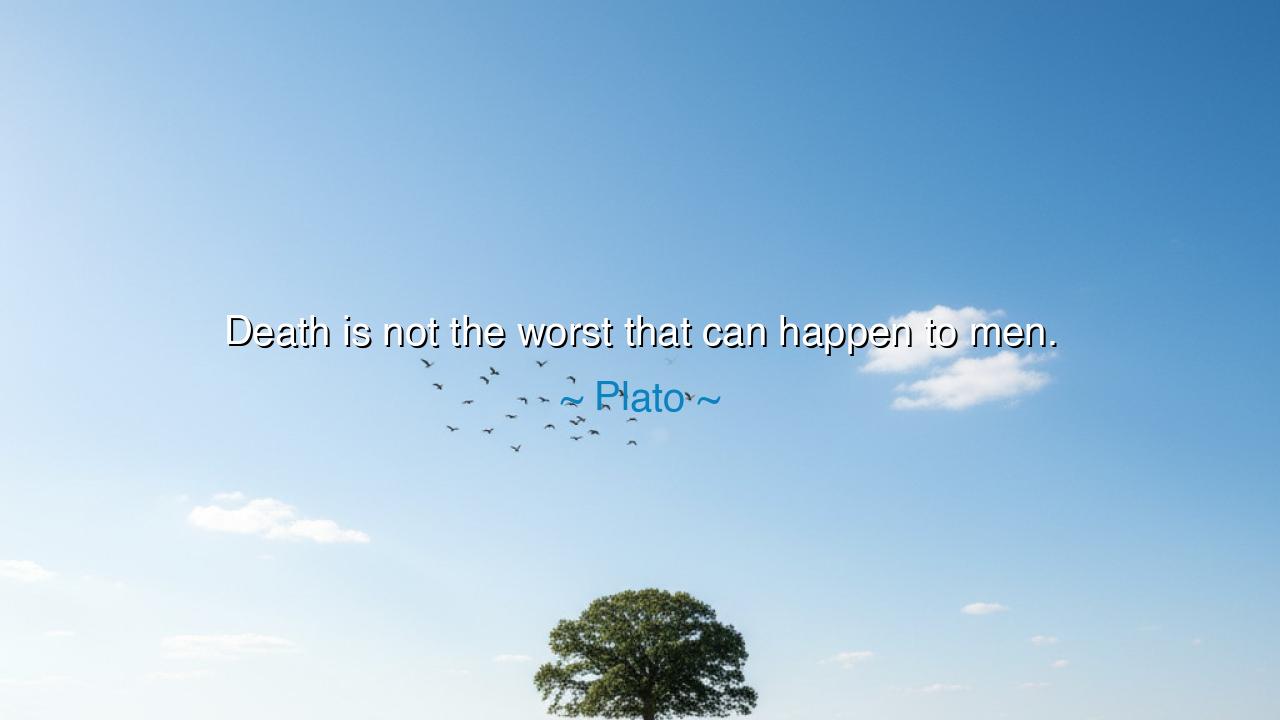
Death is not the worst that can happen to men.






“Death is not the worst that can happen to men.” — thus spoke Plato, the philosopher of souls and eternal forms, whose words echo through the corridors of time like the tolling of a temple bell. In this short and solemn sentence, he reveals a truth that pierces the illusion of fear: that there are fates more grievous than the end of life itself — the death of honor, the decay of virtue, the betrayal of truth, and the corruption of one’s soul. To fear death above all is to misunderstand the essence of living; for it is not the cessation of breath that should terrify us, but the living without purpose or integrity.
Plato, who watched his teacher Socrates face the poison cup with calm eyes, understood that death was not the enemy. The enemy was cowardice — the surrender of one’s soul to lies, to fear, to the comforts of a dishonorable peace. In the Apology, Socrates tells the judges of Athens that to fear death is merely to pretend to know what we do not know; and that perhaps death, being a release from the body, is the soul’s truest liberation. What is truly dreadful, he says, is not dying, but living unjustly — doing wrong, betraying virtue, and losing the harmony of one’s inner self. In this, Plato’s words become both shield and mirror: they defend the noble heart and reflect the corruption of those who have forgotten what makes life sacred.
To the ancients, death was never the greatest misfortune. It was seen as a natural completion of the cycle — the fading of the mortal shell, not the extinction of the soul. But dishonor, cowardice, and moral decay — these were evils that destroyed the eternal part of man. The warrior who fled the field to save his body but lost his name was thought to have died a thousand times more truly than one who fell with sword in hand. Thus, the Spartans carved upon their hearts the creed that aligns with Plato’s teaching: “Come back with your shield, or on it.” For what profit is there in surviving, if survival means the death of all that is noble within?
Consider the story of Socrates himself, whose calm acceptance of death remains a beacon through the ages. Offered a chance to escape his execution, he refused. To flee would have been to deny his own teachings, to betray the very truth he had lived for. He chose instead to die in the service of wisdom, leaving his disciples not a legacy of fear, but one of courage, faith, and honor. And so, his body perished — but his soul, and the truth he lived for, became immortal. From his death, Plato drew this timeless understanding: that the measure of a man is not how long he lives, but how faithfully he guards his soul.
Look also to the tale of Joan of Arc, centuries later, who faced her fiery death not with despair, but with radiance. She was only a girl, yet she bore within her the courage of a nation. When threatened with the pyre, she could have recanted, could have lived by denying her voice. But she chose truth over survival. And as the flames rose, she was transfigured from mortal to legend. Her body burned, but her spirit, like Socrates’, lived on — untouched by the fire. Her death was not tragedy, but triumph.
Plato’s teaching, then, is not merely philosophical; it is a code of life. To live well is to live justly, bravely, and truthfully — even when it brings suffering. To live in deceit, to betray one’s conscience, or to harm others for gain — that is a slow and silent death of the spirit. Many walk the earth breathing, yet their souls have already turned to stone. The true death is not in the grave, but in the heart that no longer feels, the conscience that no longer stirs.
Therefore, my listener, take heed: do not fear death, for it is only a shadow that passes; fear instead the loss of your soul. Guard your inner truth as you would guard sacred fire. When life tempts you with the ease of dishonor, remember that every lie, every cowardly act, is a small dying. Choose instead the path of integrity, even if it costs you comfort, even if it leads you to the edge of darkness. For the one who dies with their soul unbroken has conquered mortality itself.
So let these words of Plato be carved upon your heart: “Death is not the worst that can happen to men.” The worst is to live as though one were already dead — without faith, without virtue, without love. Stand firm, therefore, in truth and in courage. Let your deeds be worthy of your breath, and when death comes — as it must — greet it not as an enemy, but as a brother who finds you unafraid. For only those who have lived nobly can die beautifully, and only those who have lived truly never truly die.






AAdministratorAdministrator
Welcome, honored guests. Please leave a comment, we will respond soon